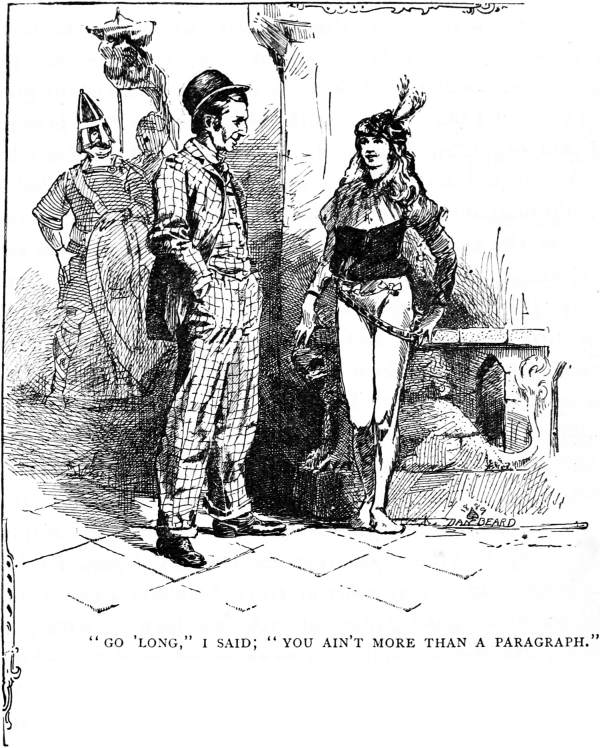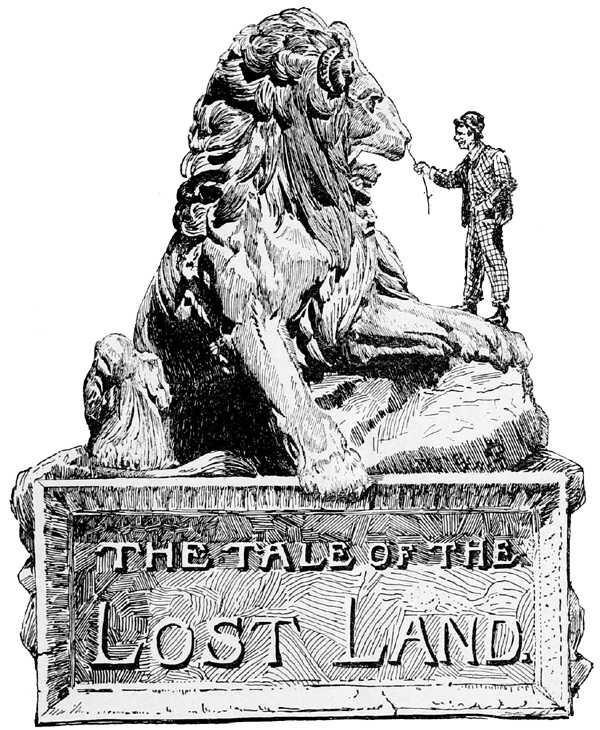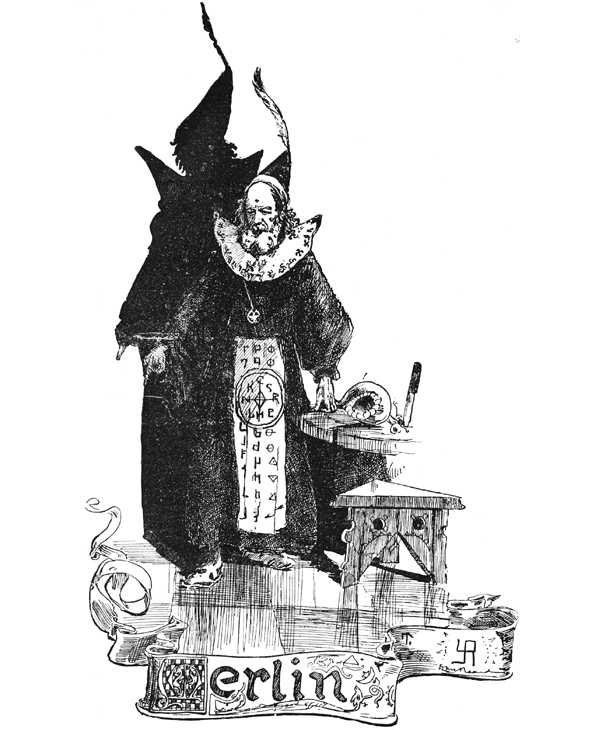A Connecticut Yankee in King Arthur’s Court
II. King Arthur’s Court



The moment I got a chance I slipped aside privately and touched an ancient common looking man on the shoulder and said, in an insinuating, confidential way:
“Friend, do me a kindness. Do you belong to the asylum, or are you just on a visit or something like that?”
He looked me over stupidly, and said:
“Marry, fair sir, me seemeth—”
“That will do,” I said; “I reckon you are a patient.”
I moved away, cogitating, and at the same time keeping an eye out for any chance passenger in his right mind that might come along and give me some light. I judged I had found one, presently; so I drew him aside and said in his ear:
“If I could see the head keeper a minute—only just a minute—”
“Prithee do not let me.”
“Let you what?”
“Hinder me, then, if the word please thee better.” Then he went on to say he was an under-cook and could not stop to gossip, though he would like it another time; for it would comfort his very liver to know where I got my clothes. As he started away he pointed and said yonder was one who was idle enough for my purpose, and was seeking me besides, no doubt. This was an airy slim boy in shrimp-colored tights that made him look like a forked carrot, the rest of his gear was blue silk and dainty laces and ruffles; and he had long yellow curls, and wore a plumed pink satin cap tilted complacently over his ear. By his look, he was good-natured; by his gait, he was satisfied with himself. He was pretty enough to frame. He arrived, looked me over with a smiling and impudent curiosity; said he had come for me, and informed me that he was a page.

“Go ’long,” I said; “you ain’t more than a paragraph.”
It was pretty severe, but I was nettled. However, it never phazed him; he didn’t appear to know he was hurt. He began to talk and laugh, in happy, thoughtless, boyish fashion, as we walked along, and made himself old friends with me at once; asked me all sorts of questions about myself and about my clothes, but never waited for an answer—always chattered straight ahead, as if he didn’t know he had asked a question and wasn’t expecting any reply, until at last he happened to mention that he was born in the beginning of the year 513.
It made the cold chills creep over me! I stopped and said, a little faintly:
“Maybe I didn’t hear you just right. Say it again—and say it slow. What year was it?”
“513.”
“513! You don’t look it! Come, my boy, I am a stranger and friendless; be honest and honorable with me. Are you in your right mind?”
He said he was.
“Are these other people in their right minds?”
He said they were.
“And this isn’t an asylum? I mean, it isn’t a place where they cure crazy people?”
He said it wasn’t.
“Well, then,” I said, “either I am a lunatic, or something just as awful has happened. Now tell me, honest and true, where am I?”
“In King Arthur’s Court.”
I waited a minute, to let that idea shudder its way home, and then said:
“And according to your notions, what year is it now?”
“528—nineteenth of June.”
I felt a mournful sinking at the heart, and muttered: “I shall never see my friends again—never, never again. They will not be born for more than thirteen hundred years yet.”
I seemed to believe the boy, I didn’t know why. Something in me seemed to believe him—my consciousness, as you may say; but my reason didn’t. My reason straightway began to clamor; that was natural. I didn’t know how to go about satisfying it, because I knew that the testimony of men wouldn’t serve—my reason would say they were lunatics, and throw out their evidence. But all of a sudden I stumbled on the very thing, just by luck. I knew that the only total eclipse of the sun in the first half of the sixth century occurred on the 21st of June, A.D. 528, O.S., and began at 3 minutes after 12 noon. I also knew that no total eclipse of the sun was due in what to me was the present year—i.e., 1879. So, if I could keep my anxiety and curiosity from eating the heart out of me for forty-eight hours, I should then find out for certain whether this boy was telling me the truth or not.

Wherefore, being a practical Connecticut man, I now shoved this whole problem clear out of my mind till its appointed day and hour should come, in order that I might turn all my attention to the circumstances of the present moment, and be alert and ready to make the most out of them that could be made. One thing at a time, is my motto—and just play that thing for all it is worth, even if it’s only two pair and a jack. I made up my mind to two things: if it was still the nineteenth century and I was among lunatics and couldn’t get away, I would presently boss that asylum or know the reason why; and if, on the other hand, it was really the sixth century, all right, I didn’t want any softer thing: I would boss the whole country inside of three months; for I judged I would have the start of the best-educated man in the kingdom by a matter of thirteen hundred years and upward. I’m not a man to waste time after my mind’s made up and there’s work on hand; so I said to the page:
“Now, Clarence, my boy—if that might happen to be your name—I’ll get you to post me up a little if you don’t mind. What is the name of that apparition that brought me here?”
“My master and thine? That is the good knight and great lord Sir Kay the Seneschal, foster brother to our liege the king.”
“Very good; go on, tell me everything.”
He made a long story of it; but the part that had immediate interest for me was this: He said I was Sir Kay’s prisoner, and that in the due course of custom I would be flung into a dungeon and left there on scant commons until my friends ransomed me—unless I chanced to rot, first. I saw that the last chance had the best show, but I didn’t waste any bother about that; time was too precious. The page said, further, that dinner was about ended in the great hall by this time, and that as soon as the sociability and the heavy drinking should begin, Sir Kay would have me in and exhibit me before King Arthur and his illustrious knights seated at the Table Round, and would brag about his exploit in capturing me, and would probably exaggerate the facts a little, but it wouldn’t be good form for me to correct him, and not over safe, either; and when I was done being exhibited, then ho for the dungeon; but he, Clarence, would find a way to come and see me every now and then, and cheer me up, and help me get word to my friends.
Get word to my friends! I thanked him; I couldn’t do less; and about this time a lackey came to say I was wanted; so Clarence led me in and took me off to one side and sat down by me.
Well, it was a curious kind of spectacle, and interesting. It was an immense place, and rather naked—yes, and full of loud contrasts. It was very, very lofty; so lofty that the banners depending from the arched beams and girders away up there floated in a sort of twilight; there was a stone-railed gallery at each end, high up, with musicians in the one, and women, clothed in stunning colors, in the other. The floor was of big stone flags laid in black and white squares, rather battered by age and use, and needing repair. As to ornament, there wasn’t any, strictly speaking; though on the walls hung some huge tapestries which were probably taxed as works of art; battle-pieces, they were, with horses shaped like those which children cut out of paper or create in gingerbread; with men on them in scale armor whose scales are represented by round holes—so that the man’s coat looks as if it had been done with a biscuit-punch. There was a fireplace big enough to camp in; and its projecting sides and hood, of carved and pillared stonework, had the look of a cathedral door. Along the walls stood men-at-arms, in breastplate and morion, with halberds for their only weapon—rigid as statues; and that is what they looked like.
In the middle of this groined and vaulted public square was an oaken table which they called the Table Round. It was as large as a circus ring; and around it sat a great company of men dressed in such various and splendid colors that it hurt one’s eyes to look at them. They wore their plumed hats, right along, except that whenever one addressed himself directly to the king, he lifted his hat a trifle just as he was beginning his remark.
Mainly they were drinking—from entire ox horns; but a few were still munching bread or gnawing beef bones. There was about an average of two dogs to one man; and these sat in expectant attitudes till a spent bone was flung to them, and then they went for it by brigades and divisions, with a rush, and there ensued a fight which filled the prospect with a tumultuous chaos of plunging heads and bodies and flashing tails, and the storm of howlings and barkings deafened all speech for the time; but that was no matter, for the dog-fight was always a bigger interest anyway; the men rose, sometimes, to observe it the better and bet on it, and the ladies and the musicians stretched themselves out over their balusters with the same object; and all broke into delighted ejaculations from time to time. In the end, the winning dog stretched himself out comfortably with his bone between his paws, and proceeded to growl over it, and gnaw it, and grease the floor with it, just as fifty others were already doing; and the rest of the court resumed their previous industries and entertainments.
As a rule, the speech and behavior of these people were gracious and courtly; and I noticed that they were good and serious listeners when anybody was telling anything—I mean in a dog-fightless interval. And plainly, too, they were a childlike and innocent lot; telling lies of the stateliest pattern with a most gentle and winning naivety, and ready and willing to listen to anybody else’s lie, and believe it, too. It was hard to associate them with anything cruel or dreadful; and yet they dealt in tales of blood and suffering with a guileless relish that made me almost forget to shudder.
I was not the only prisoner present. There were twenty or more. Poor devils, many of them were maimed, hacked, carved, in a frightful way; and their hair, their faces, their clothing, were caked with black and stiffened drenchings of blood. They were suffering sharp physical pain, of course; and weariness, and hunger and thirst, no doubt; and at least none had given them the comfort of a wash, or even the poor charity of a lotion for their wounds; yet you never heard them utter a moan or a groan, or saw them show any sign of restlessness, or any disposition to complain. The thought was forced upon me: “The rascals—they have served other people so in their day; it being their own turn, now, they were not expecting any better treatment than this; so their philosophical bearing is not an outcome of mental training, intellectual fortitude, reasoning; it is mere animal training; they are white Indians.”

